10 Negative Traits of the Unhealthy INFJ
INFJs at their best are insightful, kind, visionary, and creative. However, the unhealthy INFJ can be a nightmare to encounter. As an INFJ myself, I’m all too familiar with some of our bad habits. Some of these negative traits many of us will relate to – while others will (hopefully) be unrelatable because INFJs only experience them at their absolute worst.
Not sure what your personality type is? Take our new personality questionnaire here. Or you can take the official MBTI® here.
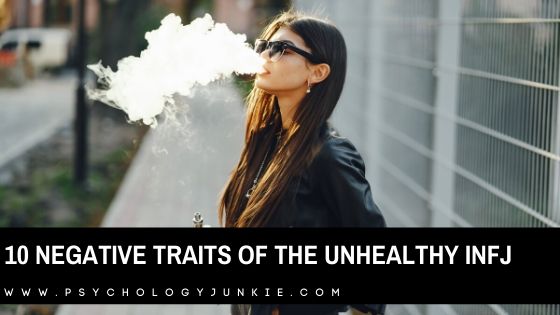
This article contains affiliate links. If you purchase an eBook from one of my links I get a small percentage back to help run my site.
Table of contents
Estimated reading time: 10 minutes
What Makes an INFJ Unhealthy?
Before we get into the negative traits, let’s take a look at some of the reasons why INFJs get to an unhealthy phase in the first place.
#1 – They are immature. Maybe they’ve been coddled all their lives, maybe they’ve been catered and pandered to. If so, they’re lacking the maturity that comes through struggle and personal growth.
#2 – They are stressed. When INFJs are extremely stressed they can’t use their mental processes to the best of their ability. They experience “grip” stress and can become extraordinarily impulsive and reckless.
#3 – They aren’t appreciated for who they are. When INFJs grow up in families where they are expected to adapt to the behaviors of their parents, they can wind up at a developmental disadvantage. INFJs who are encouraged to act like ESTJs, for example, are like left-handed individuals who are forced to write with their right-hand. They might be unstable, less sure of themselves, and more insecure.
#4 – They’re in a loop. Because INFJs are introverts, it can be tempting for them to stick with their introverted functions (Introverted Intuition and Introverted Thinking). When this happens, they can wind up becoming unbalanced, critical, and out of touch with reality. You can find out more about the INFJ loop here.
So, now that we’ve looked at the reasons why INFJs can display negative traits, let’s start exploring what those traits are.
10 Negative Traits of the Unhealthy INFJ
- They think they’re superior
This trait shows up often in people who have only recently discovered their INFJ type. It’s pretty normal for INFJs to feel misunderstood in early life because so few people are actually similar to them. When they finally do discover that there’s an answer for all their confusion, they can swing too far the other direction and start believing that they are the BEST empaths, the BEST personality type, the MOST insightful. They start looking down on “commoners” (other more common personality types) and give off an air of pretension and snobbery (not very empathic or insightful, to be honest).
- They can be out of touch with reality
When INFJs are in a Ni-Ti loop, they get so fixated on theorizing about the future and keeping to themselves that they lose touch with the human condition and the real world around them. The INFJ’s auxiliary function, Extraverted Feeling (Fe), is what keeps them connected to events and people around them. Even the inferior function, Extraverted Sensing (Se), helps INFJs to be more grounded and in touch with facts and relevant details.
When INFJs are in a loop they become stuck in analysis-paralysis. Other signs of a loop include:
- Combatively using intelligence to prove self-worth
- Being cynical and critical of themselves and others
- Claiming to be self-aware, but being incapable of honesty about their own feelings
- Blindness to their own emotional dysfunction
- Difficulty processing own emotions. May blow up prematurely, only to regret it later.
- Isolating themselves excessively – canceling plans and being unreliable in relationships
- Being clumsy and/or oblivious more often than not
- They can be people-pleasers
INFJs crave harmonious, positive interactions with people. Conflict is anathema to them, and they hate the feeling of letting anyone down. This is especially true of INFJs who are 2s in the enneagram system. Because INFJs are so driven to help others and to create a positive sense of morale, they can have a hard time saying no or setting strong boundaries. Being in the midst of conflict situations and letting their voice be heard can also be a trial for them. They may be guarded, burned-out, or taken advantage of by others because of their more compliant nature.
- Can Look Down On Others as “Shallow”
INFJs are so focused on the big picture and understanding the grand scheme of things that they can be condescending or patronizing to types that prioritize a moment-to-moment focus. They may pretentiously shrug off the concerns of others, seeing them as trivial, unimportant, or silly. It can be difficult for them to connect with others if they are too fixated on how they are different from others, rather than seeing the strengths of other perspectives.
- They can get stuck in inertia
INFJs are fixated on patterns, trends, and timing. Before they act on something, they want to know the long-term implications of that decision. It’s important for them to analyze many different perspectives before they take action. While this CAN be a good thing, it can also be a roadblock to productivity. Some INFJs get so fixated on getting their timing just right, and making their plan absolutely flawless, that they never take action or they miss an opportunity.
- When stressed, they can be reckless and hedonistic
INFJs experiencing “grip stress” can become uncharacteristically pleasure-seeking, impulsive, and self-destructive. They may binge eat, drink excessively, or chase after sensory pleasures. Some INFJs find more constructive ways to deal with grip stress – they may exercise, frantically clean, or listen to loud music as a way of coping.
- They can be stubborn and single-minded to a fault
INFJs are fixated on narrowing down their options to one most ideal option for their life. They spend a lot of time analyzing and theorizing until they choose their direction, but when they decide they’re nearly impossible to sway in another direction. It’s as if their body just goes into autopilot to fulfill the needs of their vision. INFJs can procrastinate A LOT, but when they have a crystallized vision, they are nearly unstoppable. While this can be good, it can also make them absolutely immovable when alternate suggestions are made. They may push ahead frantically to achieve their vision, even at the cost of their health, relationships, or well-being.
- They may think everyone hates them
Most people in the world feel misunderstood at times. However, INFJs in particular, have a hard time finding people who truly “get” them. According to the most current MBTI® Manual, INFJs make up only 2.3% of the U.S. population. They often struggle to communicate their ideas and visions because so few people process information the same way they do. Their intuition is introverted in nature, so their ideas and insights are often seen as symbols or pictures inside their mind. Trying to express those ideas and images can be a struggle, and they frequently get shrugs or confused reactions rather than acceptance or curiosity. As a result, many INFJs are highly self-critical and may even feel that there is something wrong with them mentally. They may keep their inner world a secret and feel afraid to open up to anyone.
- They’re Unyielding Perfectionists
INFJs tend to get detailed, nuanced pictures in their mind of how they want their projects to look. They are visionaries with idealistic dreams and standards. This means that they can always be better, their projects can always be more perfect, and they feel a compulsion to keep growing and being better versions of themselves. While personal growth is a good thing, if it leads to a ceaseless dissatisfaction with one’s self it can become damaging. INFJs need to take time to appreciate “good enough” and rest, rather than pushing and punishing themselves to a point of burn out and chronic dissatisfaction.
- They Can Become Co-Dependent
Because INFJs tend to be natural givers, it can be easy for them to feel responsible for other people’s feelings. Naturally empathetic, they tune into the emotional wavelengths around them and try to keep them in a state of harmony. Unfortunately, this can lead to co-dependency.
What is co-dependency?
In short, co-dependency is a dysfunctional relationship where one person relies on the other for meeting nearly all of their emotional and self-esteem needs. It also describes a relationship where one person enables another person to be irresponsible, underachieving, or addictive.
Why Are INFJs Prone to Codependency?
First, let me say that not all INFJs are codependent. However, because INFJs tend to feel responsible for other people’s feelings, it can become a disease that infects their moods. They may feel that they’ve got to be wholly responsible for another person, therefore enabling the other person to continue being lazy, apathetic, or unable to deal with their emotions independently.
As someone who has been diagnosed as a codependent myself (something that was really surprising to me), it can be as simple as consistently “fixing” things for people in your family so that they don’t have to deal with the tough consequences of their actions themselves. It can mean you feel responsible when people are sad, angry, depressed, or poorly behaved. It can mean that your emotional well-being is dependent on the well-being of everyone around you.
INFJs need to be able to separate themselves from other people’s emotions now and then. They need to remember that they can only control their own feelings. If someone around them is sad, it isn’t their job to fix everything for them. If someone around them is being irresponsible, it isn’t their job to do their work for them. Co-dependency can be a result of an abusive childhood, growing up with an addicted parent, or any other number of reasons. However, usually there was a childhood lifestyle that made them feel that they had to “cover” for others or take care of other people who were being incompetent. You can find out more about codependency here. If you are a co-dependent and need help, check out Melody Beattie’s book, Co-Dependent No More: How to Stop Controlling Others and Care for Yourself
Some Tips for INFJs Who Want to be Healthier:
- REST! Say no to things you don’t want to do, forgive yourself for not being perfect, set healthy boundaries. Meditate, pray, spend time in nature, sleep at least seven hours at night.
- Say it with me, “I am NOT responsible for everyone else’s feelings.” You are NOT to blame every time someone is emotionally volatile around you. It’s not your job to fix everyone else’s emotional and lifestyle problems. Are there some lifestyle choices you need to re-consider because you haven’t been fair to yourself? Remember that YOU matter. Stand up for yourself as strongly as you stand up for others.
- Remember that you’ve got to use ALL your cognitive functions to be balanced. Being alone is good…being a hermit can be unhealthy. Call someone you love on Zoom. Write a snail mail letter to a loved one. Help out at an animal shelter. Exercise outdoors. All these activities can help you to develop healthier Extraverted Feeling and Extraverted Sensation.
- Don’t overdo it. You’re still an introvert. Get time alone every day. Get unplugged time where your phone won’t be distracting you. Spend time in total silence and let your mind wander. Your intuition will get revved up during these quiet times. You can find more ways to strengthen your intuition here.
- Deal with stress in a smart way. Get alone time, rest, journal, spend time in nature. Find more stress-reduction tips specifically for your personality type in my eBook, The INFJ – Understanding the Mystic.
- Forgive yourself. You have high standards and tend to be a perfectionist. We all make mistakes. Forgive yourself for your past mistakes. Forgive others. Acknowledge your strengths as much as you berate yourself for your weakneses.
What Are Your Thoughts?
Do you have any suggestions or ideas for other INFJs? Let us know in the comments!
Find out more about your personality type in our eBooks, Discovering You: Unlocking the Power of Personality Type, The INFJ – Understanding the Mystic, and The INFP – Understanding the Dreamer. You can also connect with me via Facebook, Instagram, or Twitter!
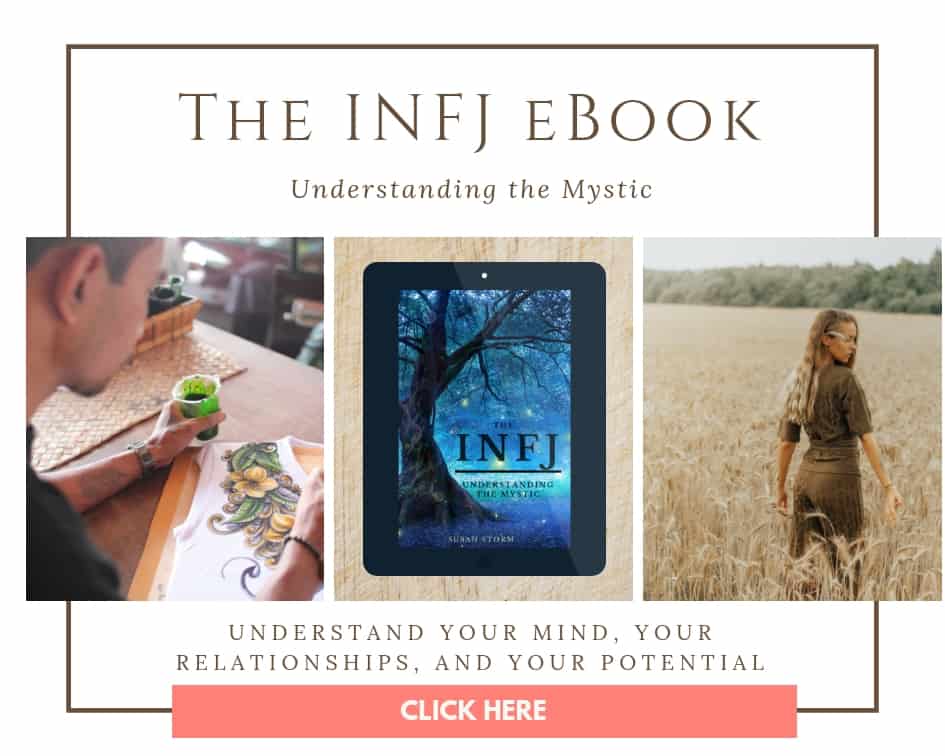



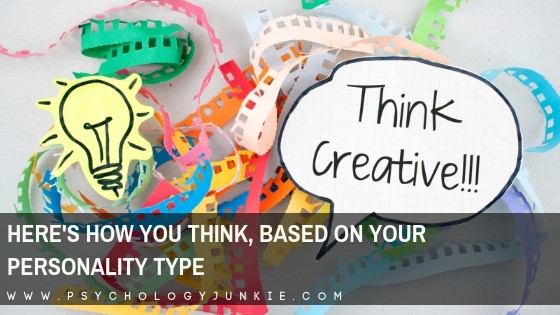






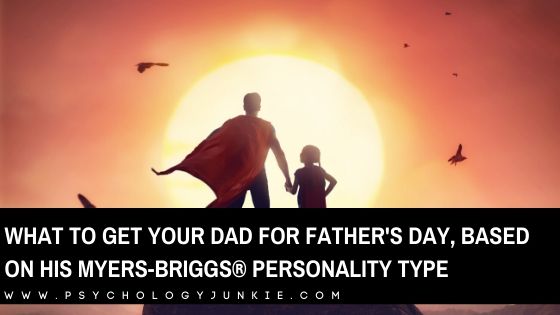
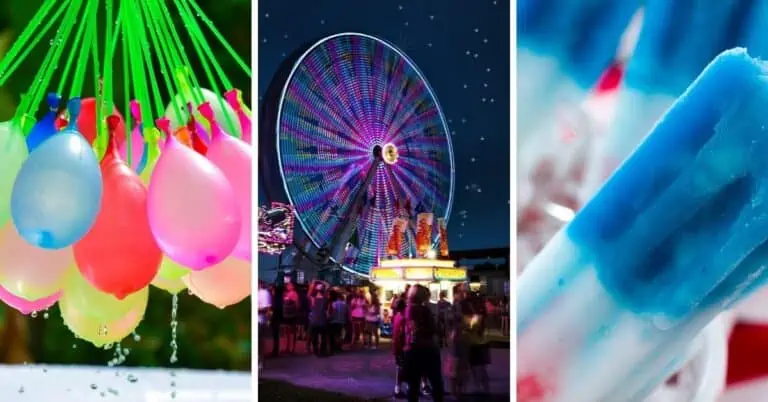

Hello
Thanks for your contents.
Say it with me, “I am NOT responsible for everyone else’s feelings.” You are NOT to blame every time someone is emotionally volatile around you. It’s not your job to fix everyone else’s emotional and lifestyle problems
In my opinion and my condition was 100% mistake
Last year my mom’s who i was caregiver of her for 8 years by my mistake fall down from wheelchair, up and down long story she passed away in two months. During this bad grief i was so mean and anger position, after she passed away 5 days I stopped eating, driking, sleeping completely. 8 months over high depression, everyday for hours , sometimes 8 hours crying, two time hospitalized,….. (I’m ESFJ)
My love ( ex-gf) could not accept my emotions in fist two months and she got restraining order to me!!! For 10 years stupid courts / lawyers they issues!!!
We had just verbal abused.
Just 5 days after mom’s passed away, my love stopped me to come home and said sleep in your van! But she was good after that up and down.
You should know someone who is in grief and high depression they ( we) need more hug, more care, we always are acting like kids that moments) so if people around be more kind with us, our grief goes out more faster with less issues around.
SpeciallY from our loves ones.
Even we are soulmates, now we are separate with to much upset time.
Please follow the book named
Fearless heart by Dr. Jimpa
Appreciated
This is very good, I can relate to a lot of it, especially feeling different from every one else. That was a great struggle as a child and young adult and I definitely thought I was superior because I didn’t care about ‘foolish’ things. I often wondered what was wrong with me at times because I hated school so much.
Thankful that I think I’m quite healthy but I struggle with being social.
If I have a choice I spend my time alone.
My work place is very social and busy so my down time is alone time. I find I have no energy for any one else.
I have almost all the negative traits, at least I think so. I like this article a lot, very accuerate. I would include the tendency to get mad with some people, especially if they are rude or selfish, o just because we have the hunch that they are not kind.
Thanks. 😉
Honestly, being my age and still living with family it’s hard to not indulge in all the negative INFJ qualities. Sometimes it happens and I’ve not even realised it happened until later, being an INFJ and being one so young is truly extremely difficult. However, I’m so thankful for this website it’s given me a bit of insight into me; the real me not the persona I show to others.
I’m experiencing all those right now hahaha, especially the co-dependency part. I didn’t realize that I am exhibiting those kind of traits. I really am unhealthy riggt now. Family life is just crazy. I wanted to get better and get away from this messed up loop.
Hi, thank you for this, but as an Infj, there are a lot of things I didn’t relate to…
And there is a great difference between INFJ-T and INFJ-A, the latter are far less stessed and care less about what people think.
Hi Lila!
Thanks for the feedback. INFJ-T and INFJ-A are actually not real Myers-Briggs personality types. A web site called 16personalities.com created a knockoff MBTI test that is famous for mistyping people. The INFJ-A or INFJ-T is related to the Big 5, a different psychometric assessment that that web site tried to “mix up” with MBTI. Because so many people mistype in the 16personalities test (the one that gives out the INFJ-A or T) I usually recommend people take the official MBTI for a more accurate type. I’ve been an MBTI practitioner for seven years, and I think about 75% of the people I know who’ve taken the 16personalities test later said they were mistyped through it.
Hi
Thank you so much for this insightful piece, I can relate to everything you wrote, some made me teary. Always felt I was different that something was wrong with me that I needed to change to fit it, but I’m infj, who feels too much cares a little too much, thank you so much ,but I really need to work on my self criticism because it really be bad